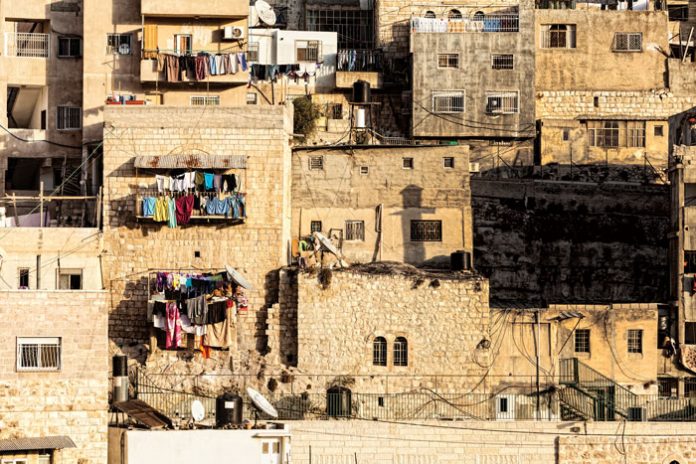I descend a flight of stairs and then another and another. The air is suffocating and the stairwell is gradually growing darker. Soon I see a narrow door on the landing with a large sign that says “Parking Level 2.” I open the door, and sure enough I find myself in a parking garage. Above the sounds of roaring automobile engines and the screech of wheels I can hear a child shouting, “Here, Shaya! Over here!”
Two little boys with peiyos are playing happily with a battered rubber ball, tossing it back and forth. The ball rolls and bounces among the parked cars as the two children chase after it. A toddler stumbles around trying to follow them, while his older sister stands guard next to his empty stroller.
Instead of playing outside in an open playground or grassy field, these kids are amusing themselves in a dark, stuffy underground parking lot, running around between dusty cars and piles of scrap metal.
A truck driver finishes unloading his merchandise at the rear entrance of a supermarket located somewhere else in the building. As he drives off, a deafening rumble echoes through the parking garage, like a thunderous waterfall. Only at the last second does the driver notice the group of children playing with their ball, and he manages to stop his vehicle with a loud squeal of the brakes. He maneuvers past them and continues on his way. The children resume their game as if it were the most natural thing in the world to play on a filthy concrete floor covered with slippery oil slicks.
I interrupt the children in the middle of their game to find out where they live. The first child refuses to answer and looks at me suspiciously. But Shaya has no problem. “That’s my house over there,” he says, pointing to a wall across from me.
I ask how many people live there.
“Just me and the baby and my sister and my parents. Only five people,” he replies innocently.
A stylish steel door is set into the wall he has indicated, but in this setting it looks as out of place as the proverbial gold ring in a pig’s nose. That kind of door belongs in the hallway of an apartment house, not in a concrete wall blackened with soot, in between a storage room for plastic bottles and a parked Mazda. Also, the “house” has no window, just a small ventilation grille. Next to the door is a small washing machine. This airless room is where nine-year-old Shaya and his family live, and this stifling, noisy parking garage is his “front yard.”
Unfortunately, this is not an isolated situation; it is representative of a large-scale phenomenon for which no one has exact figures. “We don’t want to know the actual extent of the problem,” says Rabbi Yossi Deutsch, the deputy mayor of Jerusalem and a member of the Yahadut HaTorah (UTJ) Party. “But we are talking about large numbers. Thousands of people are living in parking lots and underground storage areas in disgraceful conditions.”
Deutsch, who is also a member of the local Planning and Building Committee, is well aware of what’s going on. “It’s very painful,” he says. “We have a hard time dealing with it. What we need is precise data; that would help. But we’re also afraid to find out how serious it is—and we know that it’s serious.”





















